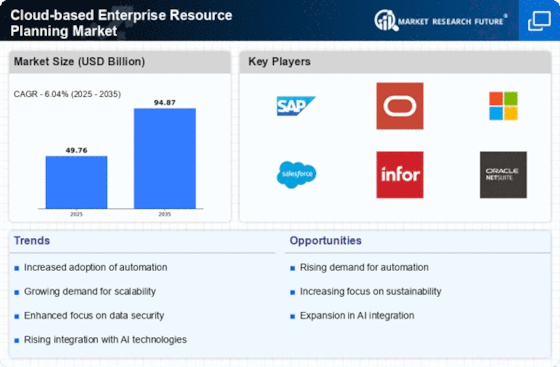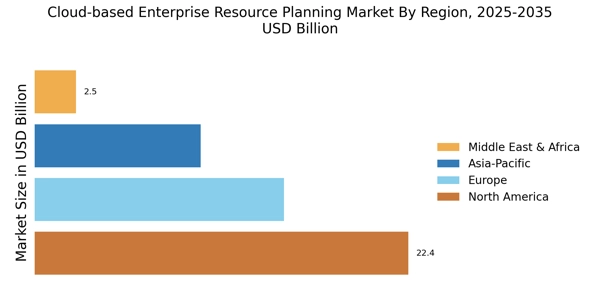Emphasis on Enhanced Customer Experience
In the Cloud-based Enterprise Resource Planning Market, there is a growing emphasis on enhancing customer experience through integrated ERP solutions. Businesses are increasingly aware that a seamless customer experience is vital for retention and satisfaction. As such, ERP systems that offer features like customer relationship management and personalized service capabilities are in high demand. Market data reveals that organizations implementing customer-centric ERP solutions have seen a 15% increase in customer satisfaction scores. This focus on customer experience is driving innovation within the Cloud-based Enterprise Resource Planning Market, as providers strive to develop solutions that not only streamline operations but also foster stronger customer relationships. The potential for improved customer engagement is likely to propel further investment in this area.
Growing Demand for Remote Work Solutions
The Cloud-based Enterprise Resource Planning Market is experiencing a notable surge in demand for solutions that facilitate remote work. As organizations increasingly adopt flexible work arrangements, the need for integrated systems that support collaboration and data access from various locations becomes paramount. This trend is reflected in the market data, which indicates that the adoption of cloud-based ERP solutions has risen by approximately 25% in the last year alone. Companies are seeking platforms that not only streamline operations but also enhance communication among remote teams. This shift towards remote work solutions is likely to drive further innovation and investment in the Cloud-based Enterprise Resource Planning Market, as businesses strive to maintain productivity and efficiency in a decentralized work environment.
Regulatory Compliance and Risk Management
Regulatory compliance and risk management are becoming increasingly important in the Cloud-based Enterprise Resource Planning Market. As businesses face a growing array of regulations, the need for ERP systems that facilitate compliance and mitigate risks is paramount. Organizations are seeking solutions that not only streamline operations but also ensure adherence to industry standards and regulations. Market data indicates that companies utilizing cloud-based ERP systems for compliance management have reduced their risk exposure by approximately 40%. This trend underscores the importance of integrating compliance features into ERP solutions, as businesses aim to navigate complex regulatory landscapes. Consequently, the Cloud-based Enterprise Resource Planning Market is likely to see continued growth as organizations prioritize compliance and risk management in their operational strategies.
Rising Need for Cost Efficiency and Scalability
Cost efficiency and scalability are becoming critical drivers in the Cloud-based Enterprise Resource Planning Market. Organizations are increasingly seeking solutions that not only reduce operational costs but also allow for easy scaling as business needs evolve. The market data indicates that companies adopting cloud-based ERP systems have reported a reduction in IT costs by up to 20%, alongside improved resource allocation. This financial incentive is compelling businesses to transition from traditional on-premise systems to cloud-based solutions. Furthermore, the ability to scale resources up or down based on demand is particularly appealing in today's dynamic market environment. As a result, the Cloud-based Enterprise Resource Planning Market is likely to witness sustained growth as more organizations prioritize cost-effective and scalable solutions.
Integration of Advanced Analytics and Business Intelligence
The integration of advanced analytics and business intelligence tools within the Cloud-based Enterprise Resource Planning Market is transforming how organizations leverage data. Companies are increasingly recognizing the value of data-driven decision-making, prompting a shift towards ERP systems that offer robust analytical capabilities. Market data suggests that the demand for analytics-integrated ERP solutions has grown by 30% over the past year, as businesses seek to gain insights into operational performance and customer behavior. This trend not only enhances strategic planning but also fosters a culture of continuous improvement. As organizations continue to prioritize data analytics, the Cloud-based Enterprise Resource Planning Market is likely to evolve, offering more sophisticated tools that empower users to make informed decisions.

















